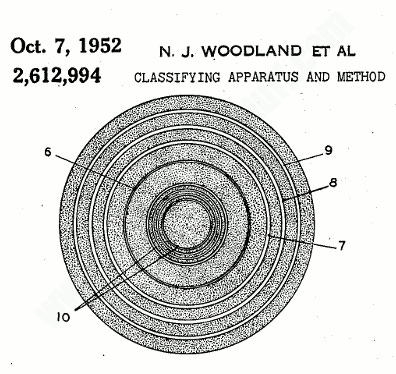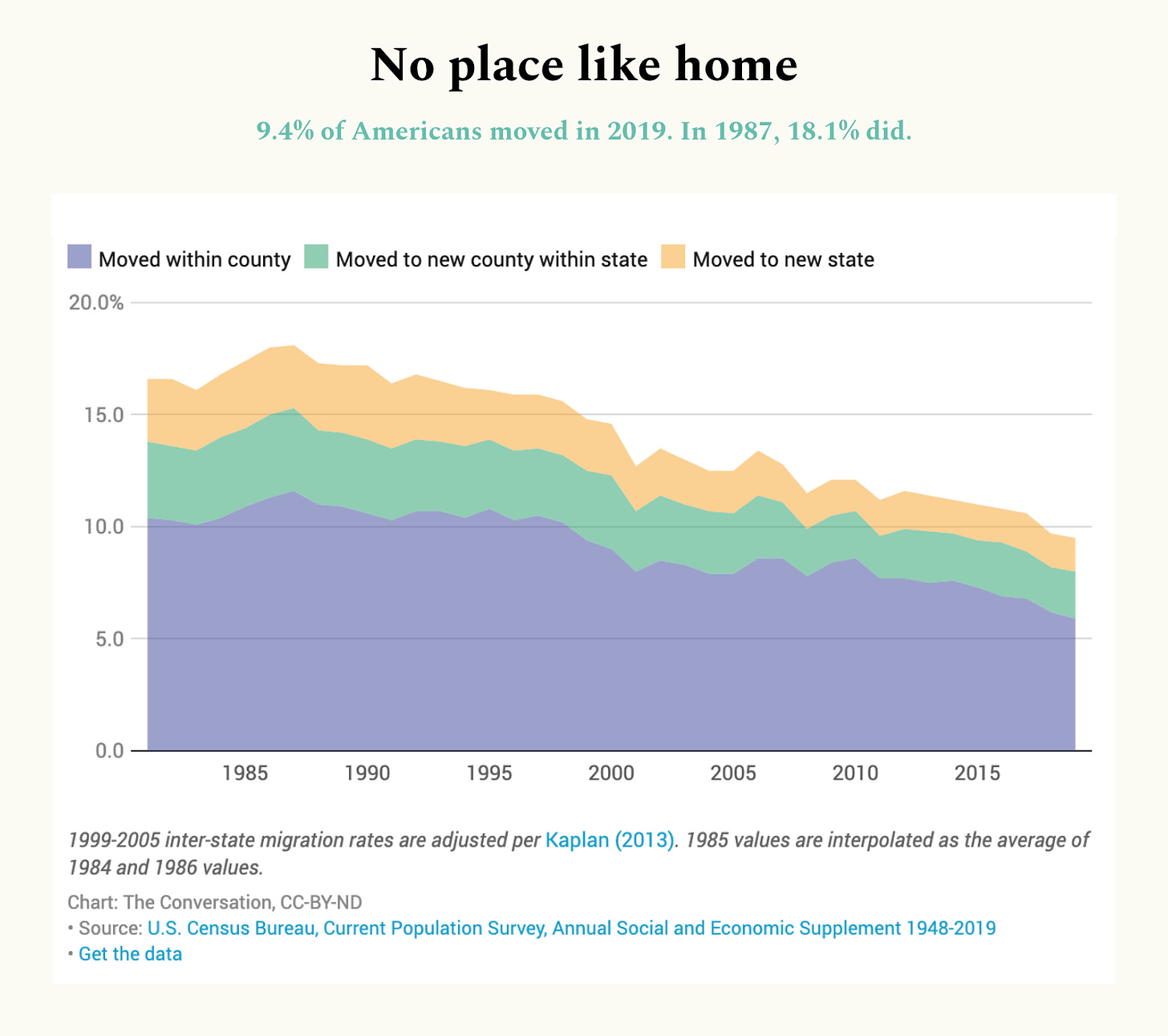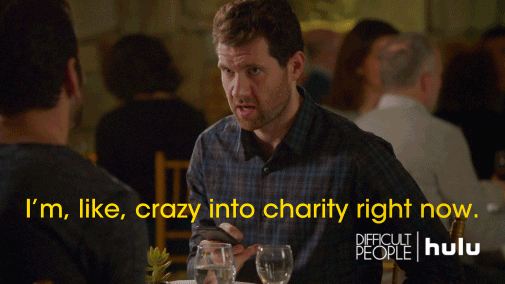
In this week’s BB, you’ll learn about…
👹 The connection between barcodes and devil worship
🏠 Why remote work may be a mirage in America
🌊 How a California beach became a ‘members’ only club
💑 Finding your soul-mate by spitting in a tube
🐘 Working with Mr. Snuffleupagus (and other jobs)
🙏 Catholic guilt, Softbank’s buyer’s remorse, committing the perfect crime
🎁 A gift and a game for Generalists
🖼️ A new winner, and pictorial puzzler
—
🕰️ If you’re new to The Generalist, you can check out our recent breakdowns of Addiction, No Code, Gaming, and Chinese AI. I particularly recommend the final one of those, written by last week’s guest, the brilliant Charlie Lyons.
🥰 If you’ve been enjoying the Briefing and would like to help, the #1 thing you can do is share this email with someone dashing, humorous, and full of good ideas.
🐰 Overheard
(Quotes from clever people)
My nature and my training would not allow me to support something I didn't believe in. I simply went against my manager's instruction and set out to design a better system.
George Laurer leaves a universal legacy. The architect of the modern barcode passed away earlier this month, with news of his death circulating this week.
In the early 1970s, while working at IBM, Laurer was tasked with creating a proposal for managers of grocery chains, outlining how Big Blue would revolutionize checkout. He was supposed to use prior art in his pitch — a bullseye shaped ‘barcode’ designed by Joe Woodland and patented in 1952.*
Laurer considered it unworkable. The printers used to produce food labels were low-quality, and prone to smear and Woodland’s circles were too small, anyway. A larger set of vertical stripes seemed a more elegant solution.
Flouting his orders and risking his job — “[my manager] made it clear that if I was wrong or I could not sell the idea to the brass, it would end my career, not his” — Laurer’s bet paid off. Sort of. While over half a century later, Laurer’s invention is used six billion times a day**, it did not bring riches. “I didn’t get a dime,” Laurer said.
—
*See above.
**Another ‘6’! That figure might raise alarms for a certain sect of hare-brained eschatologists who stubbornly claim barcodes are the ‘Mark of the Beast,’ containing the number ‘666’.
🖼️ 1000 words
(Something to look at)

The downside of being a homebody. America’s famous frontier spirit seems to have evaporated. The past 35 years have seen a steady decline in relocation, catalyzed by an increase of dual-income families (families now need to find two jobs in a new place), rising household debt (making it harder to free up capital to move), previous generations snaffling the best jobs (ok, Boomer), and the ubiquity of technology (#WFH). While many of these are good things — an increase of women in the workforce, the ostensible ease of remote work — they have contributed to many missing out on the prosperity brought about by the ‘innovation economy’.
90% of tech sectors jobs are concentrated in five US cities: San Francisco, Seattle, San Jose, Boston and San Diego. That concentration has escalated in recent years as makers of software and semiconductors embrace ‘economies of agglomeration,’ benefits created from clustering talent. Those include streamlined recruiting and dissemination of novel ideas and best practices; it’s an effect particularly pronounced in the worlds of tech and innovation.
In many ways, this has become a lose-lose for US urban dwellers: residents of the tech sector’s anointed cities battle congestion and mounting cost of living, while those in other metropolises are excluded from a dynamic part of the economy. Between 2005-2017, while San Francisco gained 77K tech jobs, Chicago lost 13K, Philadelphia and Dallas, 9K, and Los Angeles and Witchita, 8K. New York (my place of residence) and Austin — supposed challengers of West Coast hegemony — experienced gains of 7,162 and 1,200 respectively, but a decline in national share.
While companies like MainStreet (discussed in a previous BB) may be part of the solution, federal intervention may be necessary. Researchers from the Brookings Institute have suggested investing $100B over the next decade into 8-10 “growth centers” across the American heartland.
😱 Signs of the apocalypse
(Look on my Works, ye Mighty, and despair!)
Not a toy. Like many this time of year, Turkish President Recip Erdogan is anxiously checking his FedEx tracking number, awaiting a special package. Unfortunately for the rest of the world, that shipment is for a drone equipped with a machine gun. While many countries use drones for military operations, these typically use grenades as their weapon of choice; Turkey is the first country to have a UAV equipped with a firearm. Over the next decade, drones are projected to become an increasingly prominent feature of modern warfare, with the US expected to purchase > 1K combat drones, and > 43K surveillance UAVs. It’s easy to imagine how Erdogan’s newest plaything might spark envy in a certain straw-haired buffoon Stateside.
Forcing Attenborough into retirement. A beach in California was overrun with ‘penis fish’ this week, the vulgate for a troubling type of marine worm. Pinkish-grey, mucus-tipped, and growing up to 19 inches long (confirming the creature was named by a very confident male marine biologist), the penis fish lives in the ‘intertidal zone’ beneath the sand. As the number of storms increase in the coming years, a local biologist confirmed more such episodes could occur. I cannot in good conscience recommend clicking the link above — even the honeyed tones of England’s finest broadcaster would struggle to bring majesty to an image of a grey beach, surveyed by seagulls, throbbing with phalluses.
🚢 Shipping news
(The most interesting product launch this week)

A godless Church. Harvard researcher and Hemingway lookalike, George Church, shared some detail about one of his many projects: a dating app that incorporates genetic information to guide matches. DigiD8, as Church and co-founder Barghavi Govindarajan have coined the company, is designed to keep apart couples that might share the rare recessive genes that lead to severe genetic disorders.
That idea raised considerable ire this week, with many outlets and commenters comparing digiD8 to a form of eugenics. On that basis, I was very close to featuring this under “Signs of the Apocalypse,” but the matter deserves a more nuanced look: Church has made it clear that his company’s intent is to address acute hereditary disorders like cystic fibrosis or Tay-Sachs. In that respect, it may not be so different to the genetic counseling that many parents go through before conceiving, particularly in the Jewish community. Indeed, Dor Yeshorim, an Orthodox organization, has offered testing since 1983 aimed to prevent the spread of Tay-Sachs. Their website boasts that 6,082 families “have been spared from having children born with genetic disease.”
As genetic information becomes increasingly available, and gene-editing feasible, we will need to decide how much about each other we really want to know, and how much we care to change.
Honorable mentions: Pine, Lyft Rentals, Delphia.
📈 Jobs for interesting people
(Openings at companies and funds building something cool)
VC Principal - Primary Ventures (NYC). Once an insurgent, now a powerbroker of the New York scene. And unlike most success stories, no one has anything but lovely things to say about the team. Deeply alluring opportunity for B2B obsessives.
VC Summer Analyst - White Star (NYC). This global Series A fund is looking for two folks to join their Gotham team for the summer. Bonus: the gig calls for a generalist. Double bonus: you get to work with the very awesome Karolina M.
VC Senior Associate - Female Founders Fund (NYC). In 2018, women raised only 2.2% of VC funding, less than the $12B Juul brought in by itself. Ridiculous and shameful. Help fix it.
VC Manager - Sesame Ventures. Apparently, the creators of Big Bird and Oscar the Grouch have a $15MM double-bottom line fund. Presumably Count von Count is the brains behind the operation.
Product Manger - Propel (NYC). Would be all over this one. Build financial products for low-income Americans. Investors like a16z, KPCB, Omidyar Network, Kevin Durant, Serena Williams, and Nas have your back.
Pricing Analyst - Zeus (NYC). Start spending that Airbnb cheddar.
Product Manager - Understood (NYC). Build products for the 20% of Americans with learning disabilities.
VC Vice President - The Rise Fund (SF). TPG’s social impact vehicle has invested in companies around the world, including Wilderness Holdings, which seeks to preserve African wilds.
Business Development - Atomic (SF). Drum up clients for Terminal, one of the incubator’s many hustles. Maybe they could open up a couple offices in the US and help with the whole ‘agglomeration’ thing discussed above?
Data Scientist - Goodwater Capital (SF). Venture capitalists are slowly waking up to the idea that data might help them make better decisions. Goodwater’s at the forefront.
VC Principal - NVIDIA GPU (Santa Clara). A good place to be if you think AVs or AI will change the world.
VC Associate - Novartis Ventures (Boston). Venture is a hell of a drug. To get a taste of it with the pharmaceutical giant’s venture arm, you’ll need a PhD in natural science, hopefully an MBA, plus 4+ of actual work experience. Perfect for a bright-eyed and bushy-tailed 45-year old keen to jump into a junior role.
Product Manager - Earnin (Chicago). Help shift-workers get their money faster, in exchange for a recommended ‘tip’. A simple and apparently effective bit of behavioral economics, given the $190MM in company coffers.
General Manager - Branch (Toronto). Join a killer team shaking up the sleepy office furniture industry and make sitting at your desk that little bit cozier.
GM - Entrepreneur First (Berlin). A global accelerator with a burnishing reputation. Plus six weeks vacation will give you plenty of time to plot your admission to Berghain.
🐒 Long tail
(Best of the rest)
Buy-backs. The founders of Conductor, a content marketing firm, bought their company back from WeWork this week. They’re unlikely to be the only WeWork acquisitions looking for now owners: Meetup may be on the block, while Dan Teran, founder of Managed by Q — an office management provider bought in April for $220MM — is also keen to take back the reins. Others have fared worse: Spacious, which WeWork purchased in August, is closing down.
Still in the doghouse. While trimming the WeWork balance sheet might be good news for Softbank, the hits keep coming. After disappointing growth, Masa and Co. decided to sell ~50% of their stake in Wag back to the dog-walking company, a remarkable synecdoche of the fund’s failed strategy of investing by gavage.
BlueSky. Twitter CEO Jack Dorsey announced the company is forming a research group designed to build a decentralized standard for social networks. The system would allow users to sign-up for different ‘providers’ but access the same network, just as different email providers access the same set of messages. This would allow ‘clients’ like Twitter to focus on building tools on top of that information.
Sexy…baby…tiger. The inimitable Jia Tolentino dissects how Instagram has created an ethnically ambiguous but utterly uniform standard of beauty, with photo-editing tools like FaceTune serving as a form of digital plastic surgery.
The Wright stuff. The first fully electric commercial flight occurred in Vancouver this week. The craft was a collaboration between local seaplane operator Harbour Air, and engineering company, magniX. While the trip only lasted 15 minutes, the plane’s current battery has a radius of 162km, which is enough for the majority of Harbour’s trips. As battery technology improves, we may see longer distance flights get the Tesla treatment, too.
Crime and chimeras. In addition to being the name for the world-threatening virus in action-classic “Mission: Impossible II,” ‘chimera’ is a medical term referring to an individual with two sets of DNA. Chris Long is one such rarity; after receiving a bone marrow transplant, his blood and semen show the DNA of his donor. While no health risks are associated with this dualism, it does pose an interesting challenge for criminal investigators: in one instance, the DNA of a man in prison appeared at the scene of an assault. It turned out the DNA belonged to his brother, who had given him a marrow transplant.
I’m Not Lovin’ It. To many, McDonalds might be synonymous with golden arches, Happy Meals, and an infuriating jingle. (Incidentally, that jingle was performed by Justin Timberlake, and may have been written by Pusha T.) To Cierra Brown, it is the place that pays her $9.50/hour, provides her with no health insurance, and often requires her to work extra hours or risk losing her job. A candid look at life behind the counter, and the fight for a $15 minimum wage.
Benign bots. A USC Computer Science Professor has created a robot capable of brushing someone’s hair. Through discussions with stroke victims, Stefanos Nikolaidis discovered a recurring request: the desire for someone to give their folliciles a bit of tenderness. The machine uses a copper comb, along with a sensor that detects contact with human skin.
The Holy Spree. Every June, Catholics around the world contribute to Peter’s Pence, a charitable organization run by the Vatican designed to uplift the indigent. In 2018, a total of $55MM was raised. But rather than helping the poor, 2/3 of that money is being used to plug the Vatican’s deficit, with only 10% used on good works. Clearly Pope Francis’s dictum of a “poor church for the poor” does not apply within the walls of his 109 acre city-state.
💗 The Giving Game

NYU’s hot-take merchant, Scott Galloway, will be bringing “Prof Gs Predictions 2020” to the Paulson Auditorium on January 14th, 6-8pm ET. It’s an event I’m really excited about, and in the spirit of the season, I bought 2 extra tickets that I’d like to offer up to the community.
In order to make it as fair as possible, one is to attend the event in-person with me (we don’t have to sit together if you’d prefer), while the other provides access to the remote live-stream. Hopefully that allows everyone to participate in a little game I’ve devised.
Rather than handing the tickets over to whoever is quickest on the draw, I’d like to run a raffle. If you’re interested in attending — IRL or virtually — you only have to do one thing: give to a charity of your choice. If you’re short on inspiration, here are three organizations that do great work:
charity: water. Raising money to fund clean water projects in the developing world.
New Story. Using 3D printing to give people homes.
Evidence Action. A deworming initiative that is apparently one of the most impactful on a per dollar basis.
To enter the raffle, give any amount and respond to this email with a picture of the receipt. Feel free to black out the amount given; it will not make any difference in selection. The tickets cost a total of $90; $50 for the in-person event, $40 for the stream. I mention this so you can decide how much you’re willing to wager ;) Hopefully this is a fun way for all of us to do something together that makes us feel good.
🧩 Puzzler
(A question, conundrum, or riddle to mull over)

A coin is trapped under the left glass. Between the two, a matchstick is suspended. How can you extract the coin, without letting the matchstick fall?
As we wrap up work before the holidays, hopefully this pictorial riddle will keep the gears turning.* A doff of the cap is due to Charlie for producing a rather slippery brainteaser last week. The answer to his astrological conundrum was:
Scorpion, referring to October 31’s sign of the Zodiac.
Adriana V. was first to find answers in the stars, followed by NMT and Harry S. A very cosmic congratulations to you all.
Wishing you a Sunday with time enough for socializing, and staying in. 💙
—
*Hint: this is a test of scientific thinking, not tricky wordplay.


